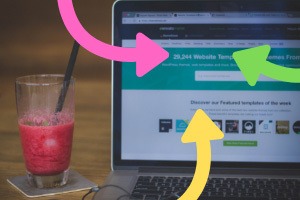Every business owner and internet entrepreneur wants to get to the first page of SERP (Search Engine Result page) for every keyword they choose for their web posts. Competition is unavoidable. When so many people talk about the same topic on their webpages, the very first task is to find less competitive long tail key phrases. If you are blogging to survive, you need to survive this tough keyword competition, but you also need to apply some other SEO techniques.
It takes a lot of searching, leaning how Google's algorithm work (which involves a lot of guessing work too), for instance. That's what internet marketers spend a lot of time on. The constant change of search engine ranking parameter keeps website owners and internet marketers work hard to their pages. Today, I am going to show you the basic but the best on page and off page SEO techniques that are evergreen.

What's The Difference Between On-Page SEO and Off-Page SEO?
In short, on-page SEO is work that you do while you create your blog article, so that search engines will recognize your post as worthy at first instance. Whereas off-page SEO is work that you do to promote your article.
The aim is to drive visitors in, so you can only start your off-page work after it's been published. The more good reactions you receive from your visitors, the higher your page will climb up in SERP, so on-page and off-page are both equally important.
Did You Know? [On-Page SEO Statistics]
- Title Tags: Titles between 50-60 characters have a 90% chance of displaying properly on SERPs (Search Engine Results Pages).
- Mobile Optimization: 87% of smartphone users use search engines at least once a day.
- Meta Descriptions: Pages with meta descriptions get approximately 5.8% more clicks than those without.
- Loading Speed: A 100-millisecond delay in website load time can drop conversion rates by 7%.
- Image Optimization: Pages with images get 94% more views than those without.
Five Best On-Page SEO Techniques 2024 and Beyond
In order to get a better Google ranking, it's crucial to apply on-page SEO technique, to each and every article post of yours. Proper approach will help you to rank with your keyword. Here are the 5 x best technique that you can apply to all your blog post.
1. Page Title (Meta Title)
It's important to find a compelling page title (also called Meta title) of the post.
Firstly your Meta title should contain the keywords. This will allow both search engines and human readers to know precisely what the exact content of your blog post. In this case, you can use a word like best, top, review and so on.
Secondly, page title is what appears in SERP, so it should be something to grab users' attention. Otherwise they won't click to visit your page. You can use some emotional words. Here are some related articles:
2. Readability

Make your article easy to read. Because part of your content ranking factors is based on visitor behaviors. If you visitors often come to your page then leave within a few seconds, it will give a bad signal to search engine crawlers. As a result there will be a possibility of your page being downgraded by them.
Trying to write the most interesting article is not the only way to keep your visitors stay longer on your page. Adding a responsive video or an infographic will also help them stay.
Did You Know? [On-Page SEO Statistics]
- Local SEO: 46% of all Google searches are looking for local information.
- High-Quality Content: Content with more than 2,000 words gets more readers and higher SEO rankings.
- Internal Linking: Using internal links can boost page views by up to 40%.
- HTTPS: 50% of page one Google results use HTTPS.
- User Experience: 38% of people will stop engaging with a website if the content/layout is unattractive.
3. Emphasis of Keywords
Place your keyword on H1, H2, and your permalink. It is true that you have to use one to two keyword densities on your article. However, it is also crucial to place your keyword in H1 (headline of your post) and H2 (one of the subtitles). Additionally, you have to include the keyword in your permalink. Also remember that you should make your permalink short and sweet.
4. Outbound Links

There are some debate about the importance of outbound links. Generally it is said that a few outbound links in a post can improve your ranking position. But some marketing experts argue that (a) they will not provide a significant impact, and also (b) outbound link is one of the biggest distractors... It means visitors will leave your site to view "more interesting sites".
However, most SEO experts advise us that placing outbound links to high authority sites such as Wikipedia or Google will help you to increase your rank.
5. Constant Updates
Content Updates. Many SEO experts also advise that Google loves fresh and unique content. Firstly websites that have unique content will able to rank easily. And secondly and as equally importantly, having a regular update with new and fresh blog content will help you to rank your keyword easily. Googlebot (or "Spider") will crawl your site more regularly as you publish new content regularly to your website.
Did You Know? [Off-Page SEO Statistics]
- Backlinks: Sites with more backlinks generally earn higher rankings on Google.
- Influencer Marketing: Influencer marketing campaigns earn $6.50 for every dollar spent.
- Social Media Shares: Social signals account for 5-6% of ranking factors.
- Domain Authority: The average Domain Authority of a Google first-page result is around 60-70.
- Guest Blogging: 60% of bloggers write 1-5 guest posts per month.
Five Best Off-Page SEO Technique 2024 and Beyond
You publish a blog post, and your job's only half-done yet. There are backing up tasks to do, and that's an off-page SEO optimizations.
1. Social Bookmarking
In today's SEO, social bookmark still affects significantly to your SERP ranking positions. Social bookmarking sites such as Tumblr.com, Reddit.com, Mix.com allows you to add web documents and share your article with other users.
Other users "bookmark your bookmark", then it will create more visibility, by both search engines and human users. Therefore, the links are considered to be quality backlinks. More bookmarking means more chance to improve your brand awareness too.
2. Social Media Engagement

You know by now that social media engagements play a significant role in modern SEO technique. Share your content to various popular social media such as Facebook, Twitter, Instagram, LinkedIn and so on.
But of course, if you don't have a real connection (friends, followers), that will mean a little. Unfortunately there is no quick solution to this. You just need to regularly log on to those major social accounts and "say something"...voice your opinion, "like" your followers' posts and leave comments.
These actions will create a trust relationship in between you and other users/followers. Hopefully they click your shared post, and click the link, which means it will bring direct traffic to your site.
Did You Know? [Off-Page SEO Statistics]
- Brand Mentions: Google considers both linked and unlinked brand mentions in search ranking.
- Local Listings: 56% of local businesses haven’t claimed their Google My Business listing.
- Trustworthiness: Off-page SEO builds site credibility, with 73% of marketers believing it's effective for improving trustworthiness.
- Referral Traffic: Referral traffic has an 11% higher conversion rate compared to average internet users.
- Content Marketing: Content marketing gets three times more leads than paid search advertising.
3. Image Sharing
As part of On-Page SEO technique, you might know that image is very important for your blog post. Images help audience retention and reduce bounce rates. You can optimize your image by adding keyword on it.
Now with Off-Page SEO, you can share your image to image sharing site such as Flickr, Tumblr, and Instagram to promote your posts. Just like social media sharing, image sharing will not only help you to increase your site presence on the internet but at the same time, you can receive direct traffic from it.
Instagram will only allow you to one hyperlink in your account. But Linktree will help you to add more, so you may want to consider using this convenient tool for free.
4. Article Submission

Another important aspect of off-page SEO is article submission. Try submitting your article to high authority article submission sites such as HubPages,
The article submission is the best way to get attention for your target audience. It will also give good quality backlinks to your webpage, hence help them to perform better in SERP. The article you submit should be unique and high-quality. Because just like any other social sharing methods, more articles you submit, the more chance of exposure of your brand. And also these sites will help direct the visitors to your site.
5. Q & A Sites
Question and answer sites are great places to interact with casual internet users, either by asking questions or answering theirs.
Quora currently dominates SERP's. It allows you to write your own article in your account with a direct link to your webpage. You can also place a link when answering a question, encouraging others to visit your site. With this method, you can also receive a quality backlink that you just need.
Mami is a multi-lingual freelancer and counseling psychologist by day, digital marketer by night, based in Tokyo. She contributes motivational quote posters to CyberCash Worldwide regularly.
Author // Mami Yamashita



Thanks to share such a informative information, off page activity possess numerous activity like (bookmark, directory). Those activities help increases ranking in SERP. I also share important tactics of off page seo techniques 2019. That’s why manifold digital marketing training institute write a blog about the off page activity. Consecutively share resemble articles.